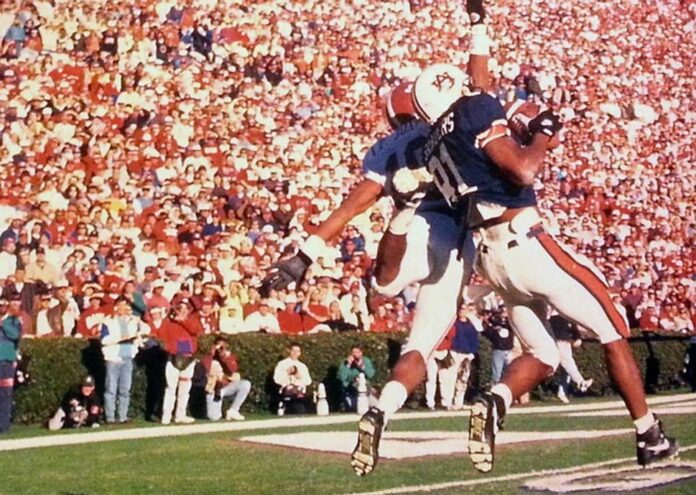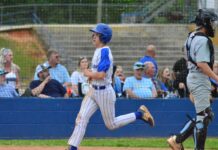
AUBURN, Ala. – As the state’s top high school recruit in the class of 1993, offensive lineman Willie Anderson chose Auburn over Alabama despite the Tigers coming off consecutive non-winning seasons while their in-state rival had just won the national championship.
“I wanted to be part of the turnaround,” Anderson said. “We got that my freshman year. It was unbelievable.”
“For us it was all about rebuilding Auburn and the legacy,” remembered kicker Scott Etheridge, one of the Tigers’ captains in 1993. “Getting us back to where we were. We took that mentality and we went undefeated.”
Before the triumph there were trials. Two weeks before the season opener, the Tigers received a postseason ban for NCAA violations, an especially painful penalty for Auburn’s seniors, many of whom cried as the news broke, the tears fueling their resolve.
“We fed off the energy of the seniors,” recalled Anderson, mentioning Wayne Gandy, Stan White, Reid McMilion and Tony Richardson.
“We became special out of the leadership,” said Frank Sanders, a junior in 1993, instantly ticking off the names of 14 teammates on offense and defense who made their mark that season. “Playmakers.”
“Those guys took care of me,” Anderson said. “There was a standard of toughness you had to have to play at Auburn and all of those guys expected me to have that. They made sure I abided by that toughness too. We felt like we were better prepared, and we practiced tougher than every team.”
Auburn coach Pat Dye stepped down after the 1992 season. Terry Bowden came to the Plains from Samford and impressed on the team the importance of attitude.
“It would take us developing, having and displaying an attitude of greatness to show the world about Auburn football,” Sanders said.
Showing the world would be a challenge because of an additional NCAA penalty indicative of a bygone era, a television ban. The 1993 Auburn Tigers would be heard, not seen.
For the upperclassmen, Dye’s influence still weighed heavily.
“The players on every level, from scholarships to walk-ons, were committed to the coaches, each other and Coach Dye,” Sanders said. “Especially Coach Dye.”
Sanders credited Bowden for how he managed the coaching staff, giving autonomy to the defensive coaches and coordinator Wayne Hall while the offensive-minded head coach focused on his area of expertise.
“It was like two head coaches working together,” Sanders said.
Not much was expected of the 1993 Auburn Tigers. On probation, off TV, and a new coach making a jump to the big time.
“I was 36,” Bowden said. “I was the youngest head coach in the country at that time. I’d had 10 years to mess up everywhere else to prepare me for that experience. I was a lot more prepared than people thought, just because I’d been a head coach for 10 years in college at a smaller level.
“Coach Dye is a legend. I was replacing someone who had brought Auburn’s program to an equality with Alabama, getting the game to Auburn and bringing the two programs to a level stage.
“People didn’t know what to expect. There was worry, and there was doubt.”
The doubts subsided as the victories accumulated. Ole Miss, LSU, Vanderbilt, Mississippi State.
“When you’re going through it, you just say, ‘Hey, let’s go out there and play every week, and go win,'” said quarterback Stan White, a senior captain in ’93. “It seems very simple, but we had that mindset because we weren’t expected to be very good.”
Then came No. 4 Florida to Jordan-Hare in mid-October.
“Everyone thought nationally, ‘Who’s this team that’s not on television? They’re not going to be able to hang with Spurrier and that juggernaut offense,'” White recalled.
“Most people thought, if you get into a Fun-and-Gun type game with Spurrier, you’re going to lose. That’s exactly what we did, and we won. That put us on the radar. That Florida game was the pivotal moment in that season. I think everybody on that team after that said, ‘Okay, here we come. We can do something.'”
“Going into that Florida game, nobody knew what to expect, and that’s what we love about football,” said Ace Atkins, a fifth-year defensive lineman in ’93. “You can never count anyone out. Florida was the big bad opposition, the big foe that year. Once we saw we could beat them, there was no turning back.”
Atkins credits graduate assistant Jason Merchant, a former teammate, with pointing out that Atkins’ speed as a pass rusher created a mismatch against Florida’s 6-foot-7, 296-pound All-SEC offensive lineman Reggie Green.
“He knew somebody with some speed could get to Wuerffel,” Atkins said. “That was really how I ended up playing a big part in that game. I knew the only thing I was going to be able to do was out-speed him. I certainly couldn’t out-muscle him or drive him back.”
Atkins got to Wuerffel three times, his first tackles of the season, in the second half.
Calvin Jackson’s 96-yard pick-six got Auburn on the board against the Gators. Etheridge’s tie-breaking 41-yard field goal with 1:21 remaining gave Auburn a 38-35 win.
“That was a special one to beat the Gators,” said Etheridge, who walked on at Auburn after playing only one season of high school football. “That Florida kick will always be special.”
“All of a sudden, at that point, everybody said, ‘We can do something special here,'” Bowden said. “Because nobody was better than Florida that year. That was the point at which we began to look and see ourselves as someone who could really be a contender for the conference, although we weren’t eligible for postseason. We weren’t eligible for the SEC championship. But we knew we could win it on the field. We had a chance to be the best in the SEC on the field.
“There was a point that our expectations changed, it was the day we beat Florida at Auburn.”
A month later, Auburn completed its perfect season by beating Alabama in the second Iron Bowl played at Jordan-Hare Stadium thanks in part of one of the most iconic plays in program history.
Lying on the Auburn bench, his injured knee being examined by Dr. James Andrews, White heard the roar of the crowd.
“I did not physically see the play,” said White. “I basically heard the play.”
The Play. Nix to Sanders. A 35-yard touchdown pass on fourth-and-15 that sparked Auburn’s comeback victory.
“When you think of the season, that play stands out in your mind,” said Bowden. “The improbable circumstances in a final game of the season. I think that play defined 1993.”
Auburn’s 22-14 win capped an 11-0 season, Auburn’s first undefeated, untied campaign since the 1957 national championship.
Trailing 14-5 midway through the third quarter, backup quarterback Patrick Nix replaced White when Stan tore his medial collateral ligament on a third-down blitz.
“That’s when your emotions turn,” White said. “‘Wow, is this my last play at Auburn?’ I don’t think there was any question that the players on that team, on that sideline, including myself, didn’t think we were about to come back and win that game. There was no question.”
From the sideline, White cheered on his understudy.
“I was laying down with my back on the bench, and I hear the crowd and our sideline go wild,” White said. “One of the first ones over there, my roommate, Reid McMilion, saying we just got it.
“Several of them came up, ‘This one’s for you. We’re going to win this for you.’ That really made me feel special.”
On fourth-and-15 from the Alabama 35, Bowden elected neither to punt nor attempt a 52-yard field goal.
“I thought it was too long for a field goal,” Bowden said. “Terry Daniel was an All-America punter, and he could kick it a mile, but I only needed about a half mile there. You didn’t want to go out there and punt it out of the end zone on fourth down at that important stage of the game.
“At the time, our defense was playing pretty good. It wasn’t the most difficult call of my life. Okay, it’s fourth-and-15, let’s just throw it up. If it’s incomplete, defense is in good field position. Who knows? You might get pass interference.”
While Nix grabbed his helmet, Bowden conferred on headsets with his brother, offensive coordinator Tommy Bowden, and quarterbacks coach Jimbo Fisher.
“The stars were aligned, and things fell into place,” Bowden said.
Instead of sending Sanders to the wide side of the field, his normal location, Auburn altered the alignment.
“Not sure Pat Nix had a strong enough arm to throw the deep takeoff to the field, so I flipped the formation to put Frank Sanders into the boundary, which is very short from the hash, so that Pat Nix would have a shorter throw for a takeoff,” Bowden said.
“Antonio Langham was their star cornerback. And he played on Frank the whole day. That was his job, to play on Frank Sanders. So, he always just goes out to the field and lines up, expecting Frank to come out. That’s where he always went.
“Antonio sees it late. He starts to jog across the field, and he got about halfway across, and he just signaled the other corner – stay there – he’ll stay out wide. The other guy was a very good player, too. But it took their All-American first-round draft pick and took him off Frank Sanders for that play. And Frank caught the jump ball, fell across the goal line for a score.”
“Sure enough, it worked,” White said. “They didn’t see it until the last minute. Antonio stayed on the strong side, or the wide side, where Frank usually was going. That was the matchup we wanted. They thought that Frank could outjump Tommy Johnson, and sure enough, that’s what they called, and they got that. So, he just lobbed one up and Frank went and caught it, and that kind of jolted us back into it.”
“I consider it one of my easiest catches and yet the most meaningful,” Sanders said, crediting Bowden and Auburn’s offensive coaches for taking a deep shot on fourth down on a backup quarterback’s first play.
“It gave me a chance to jump up and body Johnson and jump into the end zone,” said Sanders, who three decades later says Jim Fyffe’s “Oh, he caught it at the 2, and he dives in! Touchdown Auburn!” is his favorite radio call.
Auburn still trailed 14-12, but momentum had swung. The Tigers outscored Alabama 10-0 in the fourth quarter, taking the lead on Etheridge’s field goal and putting away the game on James Bostic’s 70-yard run with 2:19 to play.
“My favorite play because it came behind me,” said Anderson, who helped open the running lane for Bostic’s bolt.
“A lot of emotions for me personally,” said White, a four-year starter. “Last game at Jordan-Hare, last game at Auburn. Knowing we weren’t going to play for a national championship or be in a bowl. Even though I didn’t finish the game, it was very fulfilling.”
Three decades later, lessons learned during a remarkable season have propelled the 1993 Auburn Tigers.
“Whatever your dream is, it can be there for you,” Etheridge said. “But it also can go away if you don’t put the work in. Nothing but blood, sweat and tears will get it done. Everyone who doubts you, just use as fuel.
“Stay focused on your goal and don’t let anybody tell you it’s not achievable. But you have to work; it’s not going to just happen. When the cameras are not on, that’s where it all happens. I’ve always applied that to life as well.”
Copyright 2023 Humble Roots, LLC. All Rights Reserved.




























